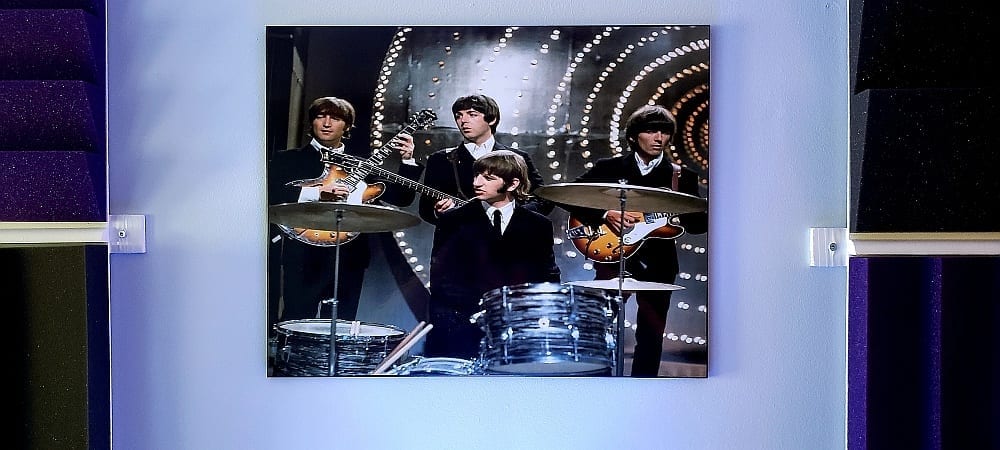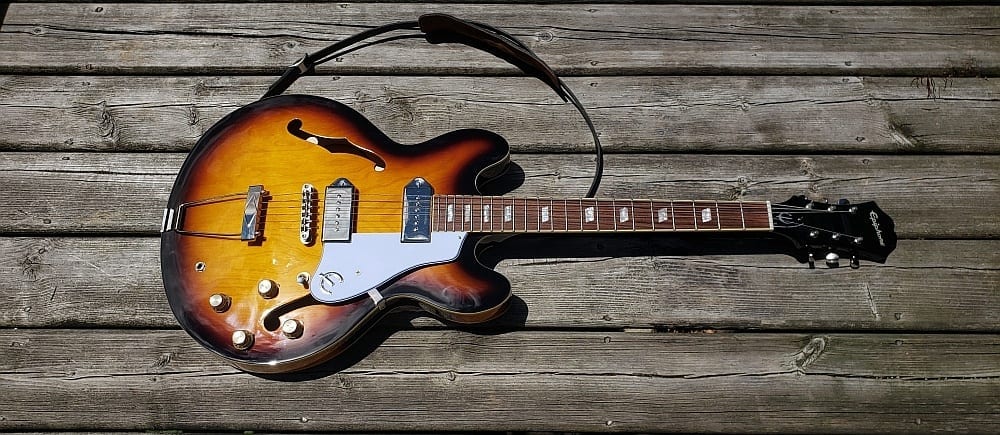I’ve always been equally amused and annoyed by brand elitism in the guitar world. And I hear it a lot, especially when someone asks “Are Epiphone guitars any good?” or “Is Epiphone better than Gibson?”
While the average listener or audience member doesn’t care what brand you play, or what country your guitar was made in, you still find a lot of brand name elitism amongst some musicians. And I don’t get it. I really don’t.
I touched on it a bit in my last article, about the good and bad of Rickenbackers (and my preferred alternative) and I attribute that elitism alternately to arrogance, patriotism or assuaging buyer’s remorse with an attempt at self-justification for spending a few thousand dollars on a guitar that didn’t magically make them a better player and they were shown up at the local jam night by the guy with the beat up budget brand overseas import.
If you’re a musician you’ve doubtless come across it more than a few times. The two examples I encounter the most are variations of “MIMs aren’t real Fenders” and “People only buy an Epiphone because they can’t afford a Gibson”. Both of those assertions are laughable
Before proceeding further, for the casual reader, I’ll provide a list of acronyms well known amongst musicians:
- MIA – Made in America
- MIC – Made in China
- MII – Made in Indonesia
- MIJ – Made in Japan
- MIK – Made in Korea
- MIM – Made in Mexico
A Brief History of Epiphone…
A brief history is probably in order too so… Epiphone has been around since 1873, starting in Greece before coming to America in 1904. The company made its first guitar in 1928 after making and repairing mandolins and banjos (and other stringed instruments) and provided Gibson with such stiff competition that Gibson bought Epiphone in 1957. Epiphone’s full history can be read here and it’s a fascinating read for musicians and history buffs alike.
Then The Beatles starting using Epiphones in the mid-60s (Paul with his Texan acoustic and John, Paul and George each had a Casino) and the company’s waxing and waning fortunes seemed pretty much set. So why then do some people insist on snide comments and brand snobbery?

Economics and globalisation are what they are. Business is business. In the 1970s Epiphone shifted production to Japan. In the 1980s rising production costs saw the company move to Korea and then in the 2000s production moved again, this time to China and, additionally, Indonesia. But with mass production meaning so little of a guitar is handcrafted now does it really matter in which country you set up a CNC machine?
Does Country of Origin Equal Quality?
While I understand personal preference, brand loyalty and patriotism I typically find it’s an American making dismissive comments about MIM Fenders and overseas Epiphones. The attitude doesn’t seem to be as common elsewhere and again, I understand patriotism and national pride. I’m Canadian. No one can touch us for bacon and maple syrup! No one!
But cost doesn’t always equate quality, at least not as an absolute. A good guitar is a good guitar regardless of where it was made. Take Gretsch for example – The only MIA models are custom shop orders. Their Proline models are made in Japan and their other lines are made in Korea, China and Indonesia.
Some guitarists refer to their favourite/best guitar as their “#1”. I don’t have one. Different guitars have different sounds/tones and, as a songwriter, I use what works best for the song and the sound I’m trying to capture. But if I did have a #1, even though it’s not my most expensive guitar, it’s my old late 90s MIK Epiphone Sheraton II. That’s the guitar I’d run back into a burning building to rescue (and my LTD Gretsch Penguin).

John Lee Hooker once described the Sheraton as “an outdid 335” and while mine is a 20 year old MIK and not an old American made model like he played I’d put my Sheraton II up against any Gibson ES-335 I’ve ever tried any day of the week and twice on Sundays. A sweet semi-hollow with humbuckers – rock, blues, jazz – my Sheraton II can do it all. With the exception of replacing the nut a few years ago, it’s still stock and still going strong. (The MIK Sheratons made at the Samick plant in the 90s tend to be highly regarded.)
I’ve tried my share of Gibsons and quite honestly, I’ve never wanted one. The company has what is arguably the worst quality control of any major brand and, if any guitar can be said to be truly overpriced, it’s definitely Gibson in my opinion. But this article isn’t about Gibson, beyond that they own Epiphone and with Epiphone technically their “budget line” comparisons are inevitable. For anyone that wants to read more about their QC issues, infamous headstock breaks, etc, as the kids say, “Google is your friend”.

Epiphone’s Hit or Miss Quality Control…
Now, having raved about my MIK Sheraton II, which was flawless “out of the box” it’s time to talk about my MIC Casino which was just the opposite and practically unplayable upon delivery.
The nut was horribly cut, the slots not being filed deep enough, and the bridge saddles weren’t filed properly either which meant the guitar had serious issues with tuning stability and intonation. Now before anyone says “Well, that’s because it’s an MIC and an Epiphone on top of that” I’ve heard from both musicians and retailers that poorly cut nuts are pretty much the norm with MIA Gibsons too. I’ve seen it myself on brand new Gibsons I’ve tried.
Sure, I was disappointed. Of all the guitars I’ve had in my life my Casino was the only one that needed work done to be playable right from the start and I’ve pretty much owned them all – MIA, MIC, MIJ, MIK and MIM. And it’s entirely possible that if running the racks was still a thing I’d have had a perfectly playable Casino out of the box.
Note – “Running the racks” refers to going into a music store, trying multiples of the same make and model and picking the best one because every guitar is just a little bit different. That’s simply the nature of manufacturing. But with most brick and mortar retail locations these days, at least here in Canada, that option is largely a thing of the past. Typically they have one, maybe two at best, of a given model in stock. And if it’s not up to par or not in the finish you want, you order one, wait, and hope the next one is.
I don’t mind doing a little work on a new guitar. In fact it’s expected that you’re going to make some minor tweaks to the action and intonation regardless of how good, or expensive, the instrument is. But you shouldn’t need to file or outright replace the nut and file the bridge saddles on a brand new instrument that was supposedly inspected by both the manufacturer and the dealer just to have a playable guitar. That has nothing to do with the brand or country of origin and everything to do with the manufacturer and dealer doing, or in this case not doing, their due diligence.
Still, once that was taken care of my Casino plays like a dream and P90s through an AC30 with a little dirt… When my wife heard it she looked at me with a big smile and said, “Oh! Now I understand what you kept talking about.” (My wife is a singer who plays a bit of keys. She’s encouraging and supportive but still, any new gear acquisition requires damned good justification on my behalf.)

The Point of Diminishing Returns…
Getting back to the “People only buy Epiphones because they can’t afford Gibsons” statement I’ve encountered more times than I can count – it’s simply asinine. The list of professionals, working musicians and big stars, that play Epiphones in the studio and on stage but can clearly afford a Gibson if they want one, is long indeed. Again, a quick search online provides all the proof you need.
Is a $1000.00 guitar better than a $200.00 guitar? It damned well should be. Is a $2000.00 guitar better than a $1000.00 one? Probably. Hopefully. Is a $3000.00 guitar better than a $2000.00 one or is spending $4000.00 better than $3000.00? Well, maybe… but there’s this thing called “the point of diminishing returns”.
The bottom line is that Epiphone makes a good guitar and some are even great. Yes, there’s a difference between a vintage American made Epi from the 60s and the current Asian made models. And yes, Epiphone makes some models for beginners but so does Fender. And yes, typically the more you spend, the better the quality but that’s no guarantee. I’d suggest being more focused on the old saying “Never buy anything made on a Monday or a Friday” than the name on the headstock.
If you want a Gibson, get a Gibson. But there’s no reason to write off Epiphone or look down on someone that plays one. People should play what they like and what inspires them and not worry about what someone else, who’s possibly simply image obsessed, thinks.
Like I said at the start, I just don’t get the elitism. It’s annoying. I also don’t get the obsession with Les Pauls and SGs. Everyone knows real guitarists play with f-holes.
- Hofner Contemporary Bass Review - March 6, 2024
- Winterwind’s 20th Anniversary – December, 21st, 2023 - December 21, 2023
- 2023 Hofner Mersey ’62 Review - November 13, 2023




